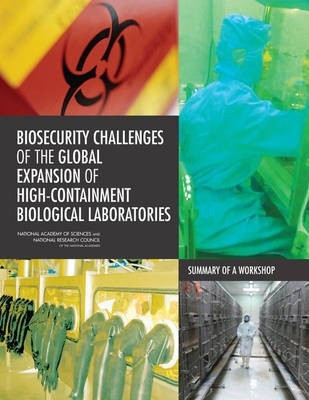Biosecurity Challenges of the Global Expansion of High-Containment Biological Laboratories(English, Paperback, National Research Council)
Quick Overview
Product Price Comparison
During July 10-13, 2011, 68 participants from 32 countries gathered in Istanbul, Turkey for a workshop organized by the United States National Research Council on Anticipating Biosecurity Challenges of the Global Expansion of High-containment Biological Laboratories. The United States Department of State's Biosecurity Engagement Program sponsored the workshop, which was held in partnership with the Turkish Academy of Sciences. The international workshop examined biosafety and biosecurity issues related to the design, construction, maintenance, and operation of high-containment biological laboratories- equivalent to United States Centers for Disease Control and Prevention biological safety level 3 or 4 labs. Although these laboratories are needed to characterize highly dangerous human and animal pathogens, assist in disease surveillance, and produce vaccines, they are complex systems with inherent risks. Biosecurity Challenges of the Global Expansion of High-Containment Biological Laboratories summarizes the workshop discussion, which included the following topics: Technological options to meet diagnostic, research, and other goals; Laboratory construction and commissioning; Operational maintenance to provide sustainable capabilities, safety, and security; and Measures for encouraging a culture of responsible conduct. Workshop attendees described the history and current challenges they face in their individual laboratories. Speakers recounted steps they were taking to improve safety and security, from running training programs to implementing a variety of personnel reliability measures. Many also spoke about physical security, access controls, and monitoring pathogen inventories. Workshop participants also identified tensions in the field and suggested possible areas for action.Table of Contents Front Matter Overview 1 Introduction 2 Framing the Issue (Plenary Sessions) 3 Assessments of Needs, Challenges, and Resources (Plenary Session) 4 Available Resources, Regulations, and Guidelines (Plenary Session) 5 Paths from Assessments to Functional Labs (Breakout Sessions) 6 Public Health Needs: Costs, Effectiveness, and Biosafety Requirements for Diagnostic Procedures (Breakout Sessions) 7 Identifying Areas for Action (Breakout Sessions) 8 Requirements for and Challenges Associated with BSL-4 Labs (Plenary Session) 9 Concluding Plenary Discussion: Major Themes and Next Steps Abbreviations and Acronyms References Appendix A: Workshop Agenda Appendix B: Committee, Participant, and Staff List Appendix C: Committee, Participant, and Staff Biographies Appendix D: Description of Tour of Pendik Veterinary Control and Research Institute Appendix E: Country and Region Overviews E1: Brazil E2: European Union E3: Pakistan E4: Russia E5: Sweden E6: Turkey E7: Ukraine E8: United Kingdom E9: United States


